|
William Lancaster
was born in England in 1839. As a child of five he immigrated with his
family to the United States, settling in Pennsylvania near Philadelphia.
The men in the family worked in the local woolen mill. William went to
a local grammar school and probably completed either the fourth or fifth
grade. The composition and spelling of William's letters to his wife during
the war indicate that his formal education was relatively limited. After
he left school William went to work in the woolen mill. Like other males
in his family, he eventually became a carder, a job of disentangling wool
flax prior to spinning using a wire-toothed brush or a machine fitted
with rows of wire teeth. It evidently was a good trade and, for that day,
paid a fairly good wage. In September of 1860, William became a US Citizen.
While working
in the woolen mill William met and sparked a local girl, Margaret Fulton.
All of William's letters refer to her as "Maggie". They were married on
July 23, 1861. In April 1862, their daughter, Lizzie, was born.
In 1860,
William and several of his friends (some seven or eight) formed the West
End Military Organization of Philadelphia, a Regulator society. He was
elected Secretary, a testimony to his good writing skills. They were never
able to gather enough funds to do anything other than talk about what
they would do. It seemed that all of them knew a war was about to come
and the idea of a Regulator Company was their way of getting prepared.
This group of irregular Regulators disbanded in early 1861 for the lack
of funds and paucity of recruits. Each member went his own way.
Very shortly
after his marriage, William enlisted in Harlan's Light Cavalry, an independent
Regiment that was to become the 11th Pennsylvania US Volunteer Cavalry,
108th Regiment of the Union Army on November 13, 1861 (William was assigned
to Company E).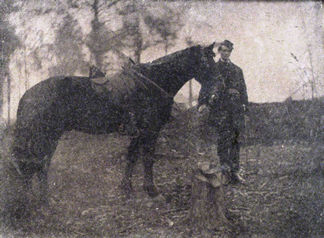 His service record shows him as a private on July 27th, 1861. While in
the Army, William progressed in rank from private to Captain. William,
despite his lack of formal schooling, had excellent leadership qualities.
Less than two months after he enlisted he was promoted to Corporal. Five
months later he was promoted to Sergeant. He remained a sergeant for a
little over two years. At that point in time when many of the enlistments
of the men in his unit had expired, William was promoted to 1st Sergeant.
He held this rank for one month and was promoted to 2d Lt. Three
months later he was promoted to 1st Lt. He served in this rank for eight
months.
His service record shows him as a private on July 27th, 1861. While in
the Army, William progressed in rank from private to Captain. William,
despite his lack of formal schooling, had excellent leadership qualities.
Less than two months after he enlisted he was promoted to Corporal. Five
months later he was promoted to Sergeant. He remained a sergeant for a
little over two years. At that point in time when many of the enlistments
of the men in his unit had expired, William was promoted to 1st Sergeant.
He held this rank for one month and was promoted to 2d Lt. Three
months later he was promoted to 1st Lt. He served in this rank for eight
months. 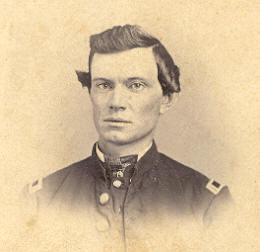 In
March, 1865 he was promoted to Captain and Company commander. In
March, 1865 he was promoted to Captain and Company commander.
During the
time he was in the Army, William exchanged letters with family, friends
and his wife Maggie. William was a prolific letter writer. Regardless
of where he was or what he was doing he managed to write at least one
letter a week to Maggie in addition to others. Most of these letters have
been preserved.
During William's
four years of service in the Union Army he received only one furlough
home. His letters reveal that he was hoping against hope each month to
get a furlough home. Even though he was wounded and hospitalized he was
not given a medical furlough. As a matter of fact he was returned to duty
really before he was completely recovered.
In early
1865 the War was winding down and he hoped to be home with his wife and
daughter soon. But on April 1, 1865 his life abruptly ended as he was
killed in action at the Battle of Five Forks – as a newly promoted Captain on March 21,
he was gallantly leading a charge. General Lee surrendered his army just
8 days later, and the War was fully ended by May.
His status of Captain is documented in letters written to Maggie by himself (his last letter) and in the book: "Register of the
Commissioned Officers of the Eleventh Regiment of Pennsylvania Cavalry
Volunteers", J.B. Lippincott & Co. 1866. His death is described in letters written to Maggie by other officers of Williams's regiment.
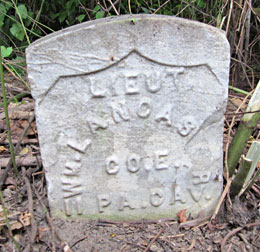 Later, Maggie
traveled to the battlefield. With the help of his fellow Officers she
claimed her husband's body, which had been buried near Dinwiddie Court House, Virginia, and returned him to Philadelphia for a proper
burial in Mount Moriah Cemetery. Later, Maggie
traveled to the battlefield. With the help of his fellow Officers she
claimed her husband's body, which had been buried near Dinwiddie Court House, Virginia, and returned him to Philadelphia for a proper
burial in Mount Moriah Cemetery.
Here are several more graves at the cemetary:
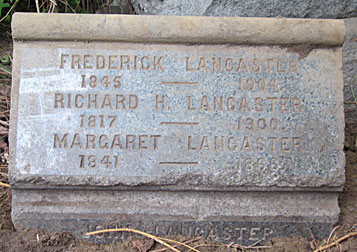 William's father, Richard H Lancaster and two unknown family members, possibly his brother and sister: William's father, Richard H Lancaster and two unknown family members, possibly his brother and sister:
Williams's uncle, John Lancaster: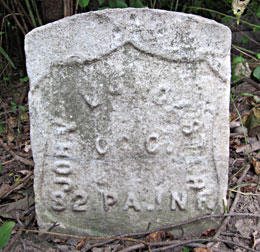 |
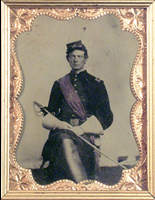

![]()